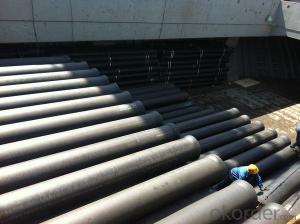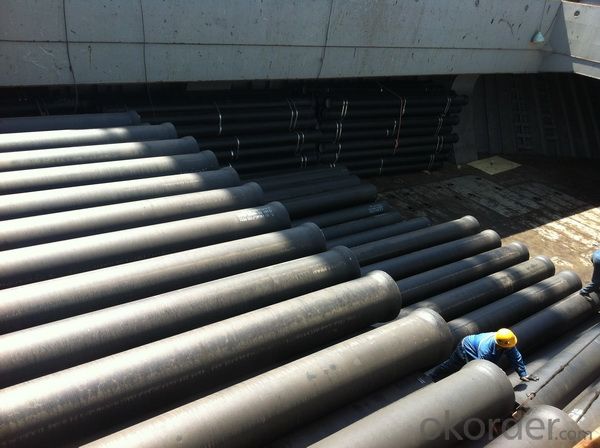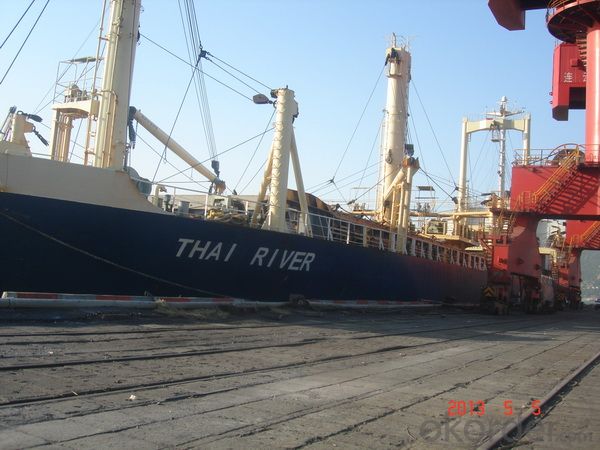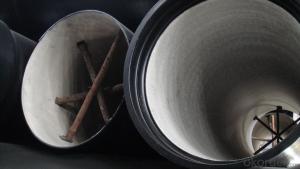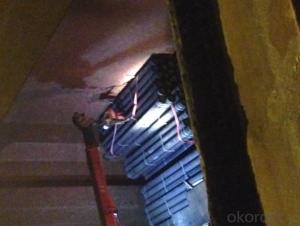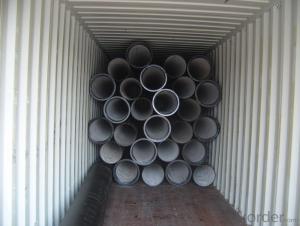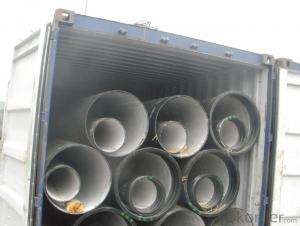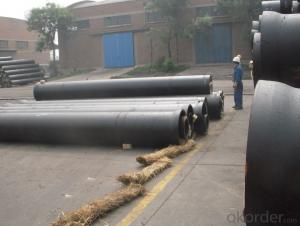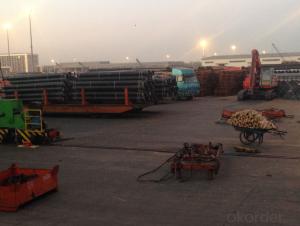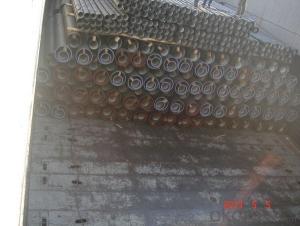DUCTILE IRON PIPES AND PIPE FITTINGS C CLASS DN100
- Loading Port:
- Tianjin
- Payment Terms:
- TT OR LC
- Min Order Qty:
- 22 pc
- Supply Capability:
- 3000 pc/month
OKorder Service Pledge
OKorder Financial Service
You Might Also Like
Material : Ductile Cast Iron
Size Range : DN 80mm to DN 2000mm
Unit Effective Length : 6m or 5.7m
Manufacture Standard: ISO 2531:1998/ EN 545:2006/EN 598:2007
Annual capacity : 200,000 tons
Coating Exterior: Zinc 130g/m2 according to ISO 8179-1 and bitumen coating 70 microns.
Cement Interior: Portland Cement/ High Alumina Cement/ Sulphate Resisting Cement Lining according to ISO 4179
Special requirements on external coating and internal lining can be applied
We also provide accessories such as SBR/EPDM rubber gaskets, lubricant paste, pipe caps, PE sleeves, etc.
Additional Parts:
Each pipe is strictly inspected according to related standard to ensure permanently high performance.
Easy Installation at site and service free for life
Long Service Lifespan
Quotation will arrive you within 24hours once we get your inquiry.
We guarantee offering you a competitive price.
A copy of original inspection reports of pipes will be offered after shipment.
Photos of loading process will be sent to the customer after shipment effect.
We will follow-up the delivery progress after shipment effect and update to the customer on weekly basis.
- Q: How do ductile iron pipes perform in sandy soil conditions?
- Ductile iron pipes perform well in sandy soil conditions due to their inherent strength and durability. The material's high tensile strength allows it to withstand the pressure exerted by the surrounding soil, preventing pipe deformation and breakage. Additionally, the corrosion resistance of ductile iron ensures a longer lifespan, even in corrosive sandy soil environments.
- Q: How do ductile iron pipes handle pressure surges in pumping stations?
- Ductile iron pipes are known for their strength and durability, making them well-equipped to handle pressure surges in pumping stations. These pipes have a high resistance to impact and are designed to withstand the sudden increase in pressure that occurs during surge events. Additionally, their flexible nature allows them to absorb and distribute the force exerted by the surge, minimizing the risk of pipe failure or damage. Overall, ductile iron pipes are a reliable choice for handling pressure surges in pumping stations.
- Q: Ductile iron pipe converter, steel transition DN100 turn 100, what is the specific accessories name? Can you supply photos?
- Plastic steel conversion parts performance description: long name high density polyethylene is mainly used for buried water supply and gas transmission pipeline links, can effectively and closely linked pipe port, quality assurance, reasonable price and price.
- Q: Can ductile iron pipe be used for wastewater treatment plant sludge handling?
- Indeed, ductile iron pipe is suitable for the handling of sludge in wastewater treatment plants. Possessing strength and durability, this material resists corrosion and endures the challenging conditions related to sludge management. Frequently employed in wastewater treatment plants for sludge transport, it ensures remarkable structural integrity and boasts an extended lifespan. Moreover, ductile iron pipe proves effortless to install and maintain, rendering it a pragmatic selection for sludge handling purposes within wastewater treatment plants.
- Q: The design uses water supply ductile iron pipe, PE corrosion protection pipe, HDPE pipe, please ask that good? What's the price of the two?
- Now the mainstream is PE pipe, ductile iron pipe has been going out.
- Q: What are the different sizes available for ductile iron pipe?
- Ductile iron pipes come in a wide variety of sizes to meet the needs of different applications in the water and wastewater industry. These pipes typically range in diameter from 3 inches to 64 inches. The most commonly used sizes are 4 inches, 6 inches, 8 inches, 10 inches, 12 inches, 16 inches, 20 inches, 24 inches, 30 inches, and 36 inches. However, larger sizes can also be manufactured for specific project requirements. Having different sizes available allows for flexibility in designing and constructing water distribution systems, sewage networks, and other infrastructure projects. The choice of the appropriate size depends on factors like the volume of flow, pressure requirements, and the distance the pipe needs to cover. It's important to note that the size of a ductile iron pipe refers to its internal diameter, which is also known as the nominal bore. The actual outside diameter of the pipe may vary slightly depending on the manufacturer and the specific dimensions provided. When selecting a size for ductile iron pipes, it's crucial to consider factors such as hydraulic capacity, installation requirements, and compatibility with other pipeline components. Seeking advice from engineers and industry experts is recommended to ensure the correct size is chosen for each particular application.
- Q: Can ductile iron pipes be used for wastewater reuse projects?
- Yes, ductile iron pipes can be used for wastewater reuse projects. Ductile iron is a strong and durable material that can withstand the corrosive nature of wastewater. It is commonly used in wastewater treatment plants and distribution systems for its ability to handle high-pressure and heavy loads. Additionally, ductile iron pipes have a long lifespan, making them a reliable choice for wastewater reuse projects.
- Q: How are ductile iron pipes different from other types of pipes?
- Ductile iron pipes are different from other types of pipes primarily due to their enhanced strength and durability. Unlike traditional cast iron pipes, ductile iron pipes have a higher tensile strength and can withstand higher internal and external pressures. They are also less prone to cracking or breaking under heavy loads or impact, making them suitable for both above-ground and underground applications. Additionally, ductile iron pipes offer superior resistance to corrosion, which increases their lifespan and reduces maintenance requirements compared to other pipe materials.
- Q: Ductile iron pipe length is generally much
- 6 meters, the bassoon is also 8 meters!
- Q: Can ductile iron pipe be used for water distribution systems in cold climates?
- Yes, ductile iron pipe can be used for water distribution systems in cold climates. Ductile iron has excellent resistance to freezing and can withstand extreme cold temperatures without becoming brittle or cracking, making it a suitable choice for water distribution systems in cold climates.
Send your message to us
DUCTILE IRON PIPES AND PIPE FITTINGS C CLASS DN100
- Loading Port:
- Tianjin
- Payment Terms:
- TT OR LC
- Min Order Qty:
- 22 pc
- Supply Capability:
- 3000 pc/month
OKorder Service Pledge
OKorder Financial Service
Similar products
Hot products
Hot Searches
Related keywords
